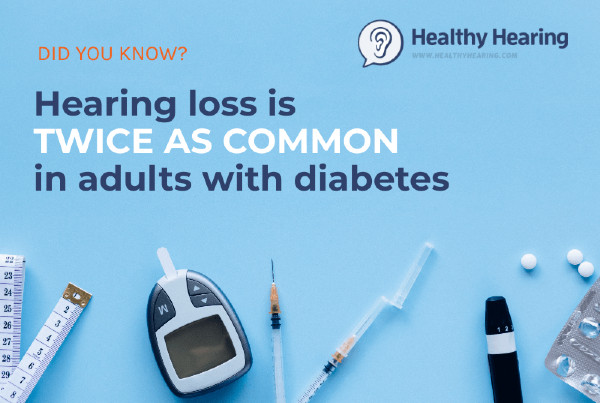|
www.HealthyHearing.com |
I have diabetes. Should I get my hearing tested?What the experts say about diabetes, hearing loss, and tinnitus
Contributed by Joy Victory, managing editor, Healthy Hearing Key points:
If you have diabetes, you likely know that complications can include vision and heart problems. But did you know it can also affect your hearing and sense of balance? Is diabetes linked to hearing loss?Yes. Diabetes and even prediabetes can put you at an increased risk of hearing loss. According to the Centers for Disease Control and Prevention (CDC), hearing loss is twice as common in people with diabetes as it is people of the same age who don't have diabetes. People with prediabetes have a 30% higher risk. People with Type 2 diabetes may face an even higher risk. A 2025 meta-analysis found they could be up to four times more likely to experience hearing loss. How does diabetes affect hearing?According to the American Academy of Audiology, high blood glucose levels from untreated diabetes likely weaken the ear's blood vessels, as well as the nerve cells, known as the "hair cells." Like other parts of the body, these hair cells rely on good circulation. Once they are damaged or die, they cannot grow or be repaired. Hearing is permanently affected. 
This increased risk means it's a good idea to get regular hearing checkups, just like you would do for your vision. How often should you get your hearing tested if you have diabetes?If you have diabetes, and haven't had a hearing test, schedule one at your earliest opportunity. Even if you don't have any hearing issues at the moment, it can help establish a baseline in case changes occur down the road. Additionally, the CDC recommends that people get their hearing tested every year if they have diabetes. Can diabetes cause tinnitus?Possibly. While it is not as studied as the link between diabetes and hearing loss, tinnitus (ringing in the ears) does seem to be more common among people with diabetes. In some cases, this may be from unrecognized hearing loss, because hearing loss frequently causes tinnitus, but people with diabetes are also more likely to have tinnitus even when they don't have hearing loss. Other ways diabetes can affect your ears and balance
Managing diabetes can help protect your earsWhile diabetes can increase your risk of hearing and balance issues, managing your condition is the best way to protect your overall health, including your ears. 
The CDC recommends staying on top of your "ABCs" for good diabetes care: "A1C (a measure of your average blood sugar over 3 months): The goal set for many people is less than 7% for this blood test, but your doctor might set a different goal for you. Blood pressure: High blood pressure causes heart disease. The goal is less than 140/90 mmHg for most people (though newer guidelines have suggested 130/80 mmHg), but check with your doctor to see what your goal should be. If you experience tinnitus from a high blood pressure drug, talk to your doctor. Cholesterol: LDL or “bad” cholesterol builds up and clogs your blood vessels. HDL or “good” cholesterol helps remove the “bad” cholesterol from your blood vessels. Ask your doctor what your cholesterol numbers should be. Smoking: If you smoke or use other tobacco products, take steps to quit. Call 1-800-QUIT-NOW (1-800-784-8669) for support. Smoking is a well-known cause of hearing problems. Lastly, take a diabetes education class: "Ask your doctor about diabetes education. Medicare pays for 10 hours of this education so you can learn how to control your blood sugar, how to eat right and how to get healthy exercise," says Kathy Dowd, CEO of The Audiology Project. Treating hearing loss earlyThe early signs of hearing loss can be tricky to detect, as hearing loss develops slowly. “Because hearing loss is typically gradual, many people don’t realize the extent of their loss until they’ve been seen by an audiologist,” said Bopanna Ballachanda, Ph.D., president of the American Academy of Audiology If you have a hunch you're not hearing as well as you used to—or a family member or friend has told you this—then don't delay getting help, as you're putting yourself at risk of auditory deprivation and other complications. Mention your diabetes diagnosisBe sure to share your diabetes diagnosis as part of your medical history with your hearing care provider. This information, along with the results of your hearing test, will help determine your treatment going forward. Hearing aids are the most common treatment for hearing loss, though depending on the severity cochlear implants or other options might be recommended instead. If you're ready to explore your options, visit our provider directory to connect with a local hearing specialist. They can help you find the treatment that fits your hearing needs, lifestyle, and budget. Joy Victory, managing editor, Healthy Hearing
Related Help Pages:
Hearing loss Causes Tests Prevention Hearing aids Tinnitus (ringing in the ears)
|
Featured clinics near me
Earzlink Hearing Care - Reynoldsburg
7668 Slate Ridge Blvd
Reynoldsburg, OH 43068

Find a clinic
Need a hearing test but not sure which clinic to choose?
Call 1-877-872-7165 for help setting up a hearing test appointment.


 Joy Victory has extensive experience editing consumer health information. Her training in particular has focused on how to best communicate evidence-based medical guidelines and clinical trial results to the public. She strives to make health content accurate, accessible and engaging to the public.
Joy Victory has extensive experience editing consumer health information. Her training in particular has focused on how to best communicate evidence-based medical guidelines and clinical trial results to the public. She strives to make health content accurate, accessible and engaging to the public.